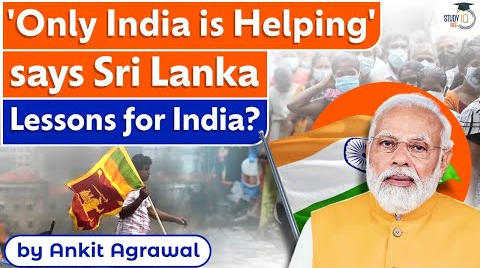Table of Contents
What has happened?
- Sri Lanka’s power and energy minister Kanchana Wijesekera said Saturday the government had requested several countries to send fuel,
- As the island nation grapples with political unrest and massive protests spurred by its worst economic crisis.
- India, he added, is the only country to have so far given Sri Lanka a line of credit to buy essential items like fuel.

- Russia – one of the world’s largest producers and exporters of oil – is among the countries Sri Lanka has reached out to for fuel aid, Wijesekera said.
- “Initial meetings have taken place in Russia. We have given our requirements and we are working on it. We are waiting to hear what sort of facility will be accommodated to Sri Lanka,” he added.
National fuel pass
- Earlier today, Wijesekerahe introduced a ‘national fuel pass’ – a rationing scheme.
- It will guarantee allocation of a quota of fuel on a weekly basis.
- A QR code will be provided for each National Identity Card holder (NIC) once vehicular and other details are verified.
- People with vehicles will get fuel based on the last digit of their registered number, while tourists and foreigners will get priority in capital Colombo.
India’s help to Sri Lanka
- India has helped Sri Lanka on multiple occasions since the crisis broke, and has supplied over $3 billion in fuel, food, medicines and other essential goods.
- This week the external affairs ministry underlined India’s stand of continued support to its neighbour.
Twin deficit problem
- At the heart of Sri Lanka’s crisis is the twin deficit problem – unsustainable fiscal and current account deficits – which, as experience shows, is a sure-fire recipe for disaster.
- However, even if external shocks were beyond its control, Sri Lanka’s fiscal problems were entirely homegrown..
- First, the Rajapaksa government effected a massive cut in taxes, reducing the value added tax by half and abolishing the capital gains tax that eroded an already narrow tax base..
- Second, those tax cuts, combined with massive expenditure outgo on subsidies, brewed a perfect fiscal storm.
- It’s worth recalling that our own balance of payments crisis of 1991 and near crisis in 2013 were in essence a consequence of spiralling twin deficits even if the proximate triggers may have been different.
Lessons from the crisis
- First, diversify your sources of foreign exchange earnings so as to not become hostage to problems in one sector or one geography.
- This, of course, is easier said than done, but even a thousand-mile journey has to start with the first step..
- Second, be careful who you borrow from. Sri Lanka was over-dependent on loans from China that were driven more by politics than economics.
- Infrastructure built with Chinese loans is underutilised even as the debt burden has piled up.
- As multilateral sources of debt have dwindled, emerging markets are being forced into bilateral loans but circumspection is needed.
- To the extent possible, borrow from countries that follow the Paris Club norms of responsible lending..
- Third, don’t commit the ‘original sin’ of floating sovereign dollar bonds.
- While commercial entities within an economy borrow in foreign currency, exposing the sovereign itself to the wild swings of global sentiment entails the risk of the economy’s resilience and credibility being called into question.
- Sri Lanka succumbed to this temptation, starting small in 2007 and accumulating a huge pile of debt on the government’s books over the years.
- Pushed to a corner, a government can inflate away its domestic debt by printing money. Alas, it cannot print dollars!
- Fourth, you need an independent central bank.
- The Central Bank of Sri Lanka (CBSL) deferred monetary tightening even as inflation soared and the currency plummeted, ostensibly under pressure from the government, until it was forced to raise the interest rate by a whopping 7% points in April.
- When it comes to central bank independence, perceptions are as important as reality, and the fact that the Lankan treasury secretary sits on the central bank’s rate-setting monetary board gives exactly the wrong signals.
- Sri Lanka’s crisis is also a reminder of the importance of timing of public policies.
- The government’s decision to encourage organic farming was a step in the right direction but it should have been preceded by a campaign to educate farmers and, Implemented after building buffer stocks to insure against possible production declines in the initial years.
conclusion
- Sri Lanka is on the boil.
- The country has run out of fuel, millions are going hungry, the healthcare system is near collapse, inflation is soaring, the currency has crashed, and the debt-laden economy is bankrupt.
- Even if IMF aid comes, Sri Lankans will have to endure years of pain before the economy gets back on track.
Q) From time to time, which among the following organizations releases “The Global Enabling Trade Report”?
- World Bank
- World Trade Organization
- World Economic Forum
- UNCTAD
Latest Burning Issues | Free PDF
























 WhatsApp
WhatsApp